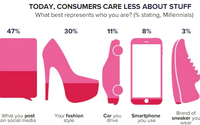Culture Trends: Rent A Mom, Test Drive A Home Before Buying
- by Larissa Faw , January 22, 2016

Peter Pan syndrome, content hacking and sleeping over in a house before you buy it are just a few trends that Mindshare is predicting will infiltrate American culture in 2016.
The fifth Culture Vulture report examines behavioral trends and insights, media consumption and demographic and sociological shifts to help brands and advertisers better connect with today's consumers.
One of the more notable trends is the commitment-phobic consumer that suggests advertisers need to remove risks of purchase in order to appease their concerns. As consumers’ approach to risk continues to shift, there’s an increasing demand for solutions to help them stay uncommitted, such as leasing and trying before you buy.
Realtor.com and Airbnb, for instance, have partnered to let people stay a few nights in a neighborhood before committing to buy a house. And 67% of consumers say "being trapped in a two-year contract is 'annoying.'"
advertisement
advertisement
"Given the increasingly commitment-free consumer mind-set, brands need to assess the specific product risks their target consumer perceives and find new ways to diminish or eliminate those risks," Mindshare states in the report.
More than half of consumers (58%) say they "prefer unique versus mass produced goods," up from 45% in 2013. To drive brand uniqueness and love, advertisers are encouraged to play up hidden messages or "Easter eggs" in their products or messaging.
The discovery, inside knowledge and ability to share hidden features on social appeals to people’s desire for uniqueness.
"Once we’d found this one, we could see it all over the place, and it has some nice implications for brands trying to get noticed," says Mark Potts, head of insights, Mindshare North America. "Again, the idea of hidden Easter Eggs is not new -- think hidden Mickey Mouse silhouettes in the Disney Parks, or the hidden track at the end of Nirvana’s Nevermind.
"But the innovation and pervasiveness that’s been driven in part by new technology is on the up. What was perhaps most surprising for us, is the noticeable jump out of tech and entertainment and into products themselves," he adds.
It used to be that people defined themselves through products and brands. They signaled they were preppie, for instance, by wearing Ralph Lauren polo shirts. Now, people identify themselves through their tweets, posts and likes.
To that end, people are more likely to say they are best represented via social media (47%) than through their fashion (30%), cars (11%), smartphone (8%), sneakers (3%), or alcohol (3%). Culture is becoming language, and content is the new "stuff."
"Consumers have more control over content than ever before. Not only are they swiping away the stuff they don’t want, they’re also changing it. Witness the ‘K Blocker,’ which purges all Kardashian references from your iPhone, or the Chrome extension that changes every Web reference of ‘Millennial’ to ‘Snake People.’ The same trend is also at play with ad blocking," the agency’s report states.
As millennials age, their attitudes are strikingly different from prior generations. They are stressed at being adults, says Mindshare. The desire to escape the worries of everyday life (and an underlying resistance to growing up) has helped set a trend in adult coloring books.
The top 10 books sold over 1.5 million copies this year combined. There’s also adult summer camps and a “Need A Mom” service in New York, which lets people "rent" a mom for help with cooking and dealing with relationship matters. Advertisers capitalized on this trend, being "cleverly childish" with their messages, or they can help millennials on this "painful path" toward adulthood.
Separately, one way to encourage chatter about a brand is aligning with pop culture or broader cultural trends. Americans' circles of empathy are growing wider, and the unofficial theme is "inclusion," with broken taboos and greater support around the LGBTQ community, mental health, body image, and even pets. A new law lets people dine at restaurants with their dogs.
And now with the change of a Facebook filter, people can communicate collective empathy at speed, like with the Paris terror attacks. Brands should use these opportunities to help bring consumers together and generate productive conversations, per the report.
Culture Vulture is Mindshare's global cultural trends program that sets out to identify macro and micro trends that impact the marketing and communications strategies of the agency's clients. The North American version includes a Mindshare proprietary survey of more than 2,000 individuals, as well as Mindshare's network of "leading edge" consumers and third-party resources, including government data, syndicated sources and behavioral data.
More on the report can be found here. The shop also has a weekly YouTube video series that further examines new trends.


